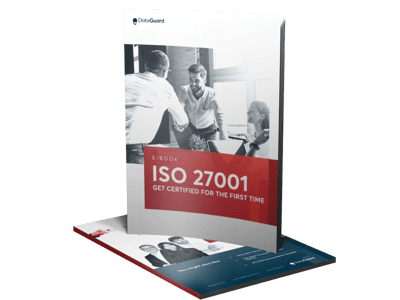Strong information security processes are no longer optional in today's tech-centric world. This is especially the case for industries like logistics.
In fact, according to a new supply chain risk report, 98% of logistics companies said that security breaches in their supply chains have negatively impacted them. These risks are common with the increasing reliance on technology in the industry, so, the need to protect sensitive data and ensure information security has never been more critical.
In this pocket guide:
How can you protect your logistics company from these risks?
What are the key information security risks that logistics companies face?
What are the ISMS requirements for logistics companies to be certified for ISO 27001?
How can logistics companies get certified for ISO 27001?
What are some ISO 27001 best practices for logistics?
What are the other ISO standards for transport and logistics?
How can you protect your logistics company from these risks?
This is where ISO 27001 comes in.
ISO 27001 is an international standard for information security management that helps companies manage information security risks and protect sensitive data. For logistics companies, this means establishing policies and procedures to safeguard personal data, financial information, and trade secrets.
In this pocket guide, we'll cover the ISO 27001 requirements for logistics industry, the benefits of certification, and how DataGuard can assist you in implementing it. Additionally, we’ll look at what other ISO standards apply to logistics companies.
But first, let’s go over specific information security risks that logistics companies face.
What are key information security risks that logistics companies face?
Information and cyber threats negatively impact the integrity of sensitive data and data protection. Here are some security concerns that logistics companies should be aware of in 2023:
- Third-party vendor risks - These risks are common in supply chains for several reasons, including:
- Limited visibility - Logistics companies may have limited visibility into their third-party vendors' security practices and policies. Without proper due diligence, it can be challenging to assess the level of security that a vendor has in place to protect their systems and data.
- Interconnected systems - Often, third-party vendors have access to a company's systems, data, and applications. This interconnectedness creates the risk of a security incident in one part of the supply chain spreading to other parts of the chain.
- Shared responsibilities - In many cases, there is a shared responsibility for information security between logistics companies and their third-party vendors. This can create gaps in responsibility and accountability, leading to security incidents.
- Lack of control - Logistics companies may not have direct control over the security practices of their third-party vendors. That can make it challenging to enforce security policies and standards.
- Digital risks - These are a natural outcome of the increasing use of technology in business. The more digital solutions a company uses, the more opportunities cybercriminals have to infiltrate the system.
Digital risks can come from software vulnerabilities or errors in configuration, and if not addressed, can lead to various threats like:
- Ransomware attacks
- Security breaches
- Malware infection
- Disruptions to processes
- Intellectual property theft, and
- Non-compliance with security standards (especially for the healthcare industry).
- Supplier fraud - Also known as vendor fraud, this happens when a cybercriminal pretending to be a trusted retailer requests changes to payment processes. They use advanced social engineering techniques like AI-generated voicemails, phishing attacks, and Deepfake video recordings, making them hard to detect.
Fraud can impact supply chain security globally and isn't limited to suppliers. Third-party vendors can also fall victim to fraud, leading to data breaches. According to the Federal Trade Commission, the US lost $5.8 billion to fraud in 2021, which is $2.4 billion more than the previous year. - Data protection - Data integrity is a significant security concern for the supply chain. It is crucial to ensure that all data, whether active or not, is secure. Data encryption practices are especially important for third-party integrations because hackers may target third-party vendors to gain access to sensitive data. So, it's essential to have security measures in place to maintain the integrity of data throughout the supply chain.
These challenges and threats are always present and ever-evolving. To avoid or mitigate them, logistics companies should consider information security standards like ISO 27001.
What is ISO 27001, and how can logistics companies leverage it to improve operations and information security?
ISO 27001 is an internationally recognised standard for information security management. It provides a framework for managing and protecting sensitive information and mitigating the risks associated with it.
For logistics companies, implementing ISO 27001 can help improve operations and information security in several ways.
- ISO 27001 is a comprehensive approach to information security that includes risk management, information management, and incident management. It can help logistics companies identify, assess and manage the risks associated with their information and take appropriate measures to mitigate those risks.
- The standard requires a regular review of information security policies, procedures, and controls, which helps to keep them up-to-date and relevant.
- ISO 27001 encourages a culture of information security awareness and promotes employee training and involvement. This can help logistics companies ensure that all employees know the importance of information security and how to protect sensitive information.
- ISO 27001 helps demonstrate compliance with regulatory authorities and standards like the General Data Protection Regulation (GDPR). That way, you can reduce the risk of financial or reputational losses due to data breaches.
- ISO 27001 can provide a competitive advantage. Information security is becoming an increasingly important factor for customers when choosing a logistics provider in the logistics industry. With ISO 27001, logistics companies can differentiate themselves from their competitors and maintain a competitive advantage.
If you’re looking to implement an ISO 27001-compliant information security management system (ISMS), the first step is to know what the standard requires for your ISMS to be certified.
What are the ISMS requirements for logistics companies to be certified for ISO 27001?
ISO 27001 specifies a set of requirements that any company can follow when setting up its ISMS. Here’s what those requirements look like for logistics companies:
- Information security policies - Establish and maintain information security policies that are aligned with the business objectives and manage risks effectively.
- Risk assessment - Conduct regular risk assessments to identify and analyse potential risks and vulnerabilities to the confidentiality, integrity, and availability of information.
- Information security controls - Implement a set of information security controls to mitigate identified risks and reduce the impact of potential security incidents. These controls can include technical, physical, and administrative measures.
- Asset management - Identify and manage information assets, including hardware, software, and data.
- Access control - Implement access control mechanisms to ensure that only authorised personnel have access to information and information processing facilities.
- Operations security - Ensure that information processing facilities are secure, and that information is processed securely.
- Communication security - Protect your information in networks and communications channels against unauthorised access and interception.
- Incident management - Establish and maintain an incident management process to detect, respond to, and recover from security incidents.
- Business continuity management - Establish and maintain a business continuity management process to ensure that the business is functional in case of a security disaster.
- Compliance - Comply with legal, regulatory, and contractual requirements related to information security.
Implementing these requirements will ensure your ISMS is ISO 27001 compliant and ready for certification.
How can logistics companies get certified for ISO 27001?
It isn’t compulsory for companies to get the ISO 27001 certification to demonstrate their compliance with the standard. However, the certification is a very useful asset.
Getting ISO 27001 certified requires a significant investment of time and resources, but it can help logistics companies show their commitment to protecting sensitive information and improving their overall information security.
Download our ISO 27001 roadmap for step-by-step guidance and timelines.
What are some ISO 27001 best practices for logistics?
ISO 27001 compliance is a continuous process of improvement even after certification. To keep your ISMS up to standard, you can follow these best practices:
- Develop Information Security Policies - Develop information security policies that establish rules and procedures for protecting sensitive information. These policies should address access control, password management, data classification, and incident management.
- Train Employees - Provide information security awareness training to all employees, including temporary staff and contractors. This training should cover the company's information security policies and procedures, as well as the risks associated with handling sensitive information.
- Monitor and Review - Monitor and review your information security controls regularly to ensure they are effective in managing risks and protecting sensitive information. This review should include periodic risk assessments, vulnerability assessments, and penetration testing.
- Continuous Improvement - Continuously improve your information security management system by identifying and addressing weaknesses in your controls, implementing new technologies and best practices, and staying up-to-date with changes in the industry and security threats.
ISO 27001 is one of, if not the most popular information security standards. However, there are other ISO standards that are relevant to logistics.
What are the other ISO standards for transport and logistics?
The ISO standards all focus on individual security aspects, and there are a few that logistics companies should consider apart from ISO 27001.
- ISO 45001 (Occupational health and safety)
ISO 45001 is designed for companies to manage and improve their occupational health and safety. Logistics companies can benefit greatly from this because they typically have a high risk of workplace incidents and injuries due to the nature of their operations.
Implementing ISO 45001 can reduce workplace incidents, leading to improved employee morale, reduced absenteeism, and lower insurance costs.
- ISO 9001 (Quality)
ISO 9001 is the standard for quality management systems. It helps companies meet customer expectations, improve customer satisfaction, and continuously improve their quality management practices.
Quality is a critical factor in the logistics industry. Customers expect reliable, on-time delivery of their goods and any errors or delays can lead to dissatisfaction, lost business, and damage to the company's reputation.
ISO 9001 identifies and addresses these quality issues before they become problems so that the above risks can be avoided.
- ISO 14001 (Environmental)
ISO 14001 provides a framework for companies to manage and improve their environmental performance. Operations in logistics companies often have a significant impact on the environment. For example, greenhouse gas emissions from transportation, energy consumption in warehouses and waste generation from packaging and other activities.
Implementing ISO 14001 demonstrates a company's commitment to sustainability and can lead to cost savings by using resources more efficiently and reducing waste.
Key Takeaways
In an age where data breaches and information security threats are becoming increasingly common, ISO 27001 can provide a competitive edge and help logistics companies protect themselves.
By following the ISO 27001 framework, you can identify, assess, and mitigate risks related to information assets, reducing the likelihood of security breaches and protecting sensitive data. Overall, it is a valuable tool for logistics companies looking to establish a comprehensive and effective ISMS that protects sensitive data and enhances overall business operations.
Interested in ISO 27001 certification? Book a call with us today!
FAQs
How long does it take to become ISO 27001 certified?
It can take up to 6 months or longer to get ISO 27001 certified, depending on your company’s current position in compliance. If you are already ISO compliant, certification can take up to a month. However, if you are not already ISO 27001 compliant, certification can take up to 6 months or more.
What is the ISO standard for supply chain management?
ISO 28000:2007 "Specification for security management systems for the supply chain." This standard provides a framework for managing security risks throughout the supply chain, including transportation, storage, and handling of goods and materials. It is designed to be applicable to any company involved in the supply chain, including manufacturers, distributors, and transportation companies.
Can a logistics company use ISO 27001 to comply with other security standards or regulations?
Yes, ISO 27001 can be used as a framework to help logistics companies comply with other security standards or regulations, such as the EU's General Data Protection Regulation (GDPR) or the Payment Card Industry Data Security Standard (PCI DSS).
What are some of the key controls required by ISO 27001 for logistics companies?
ISO 27001 includes 93 Annex A controls, but here are some that specifically relate to logistics companies:
- Identification and assessment of information security risks,
- Establishment of policies and procedures for information security management,
- Access control measures,
- Physical and environmental security, and
- Incident management and response.
Is ISO 27001 a one-time certification or does it require ongoing maintenance?
ISO 27001 certification is not a one-time process, as companies must continue to maintain and improve their information security management practices. To do this, they must perform regular internal audits and reviews, and undergo periodic external audits to keep their certification up to date.


ISO 27001 - Why Get Certified
This whitepaper will give you an overview of why ISO 27001 is essential for your organisation and how to get certified.
Download now





